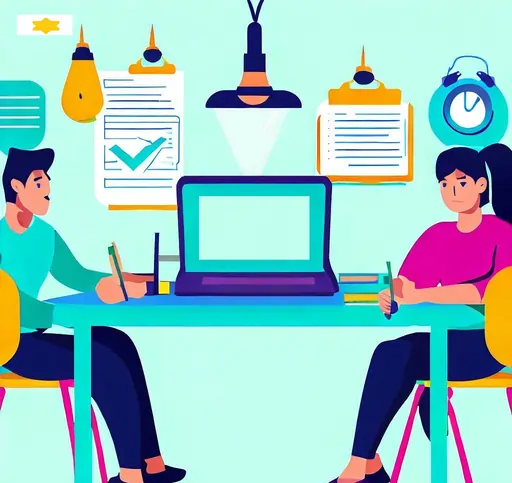The Role of Mock Exams in Assessing Exam Readiness

Understanding Mock Exams
Mock exams replicate the conditions of real exams, from the time constraints to the format of questions. They are designed to mirror the actual test experience as closely as possible, helping students become familiar with the exam environment, reducing anxiety, and improving their confidence. Mock exams can be conducted for various levels of education, including school, college, and even professional certification exams.

- Simulating Exam Conditions
- Identifying Strengths and Weaknesses
- Test-Taking Strategies
- Building Confidence
- Tracking Progress
- Familiarizing with Question Patterns
- Enhancing Time Management Skills
- Building Resilience and Perseverance
- Refining Self-Assessment and Review Skills
Mock exams play a crucial role in replicating the conditions of a real exam, offering students a valuable opportunity to experience the pressure and environment they will face during the actual test. When students take mock exams, they are exposed to the same time constraints, format of questions, and expectations that they will encounter in the real exam. This simulation helps students become accustomed to the heightened stress levels and time pressure that often accompany high-stakes assessments. By practising under such conditions, students gradually adapt and acclimate to the pressure, reducing the likelihood of feeling overwhelmed during the actual exam. This familiarity with the exam environment can lead to a more composed and focused mindset, enabling students to perform at their best under challenging circumstances. Moreover, the experience of managing time effectively in mock exams aids students in refining their time allocation strategies, ensuring that they can efficiently address each question or section within the stipulated time frame.
Mock exams serve as a diagnostic tool that helps students gain insights into their academic strengths and weaknesses. Through the analysis of their performance in practice tests, students can pinpoint specific subjects or topics where they excel and those that require improvement. This self-awareness empowers students to tailor their study efforts more effectively. For instance, a student might recognize that they struggle with understanding literary analysis in English but excel in comprehending historical contexts. Armed with this knowledge, they can dedicate additional study time to strengthening their literary analysis skills while maintaining their proficiency in historical concepts. This targeted approach to studying enables students to maximize their learning outcomes by focusing on areas that genuinely need attention, leading to a more comprehensive grasp of the subject matter.
Mock exams provide a safe and low-stakes environment for students to experiment with different test-taking strategies. Students can try out various approaches for tackling different types of questions, such as multiple-choice, essay, or problem-solving questions. Additionally, they can explore strategies for time management, such as how to allocate time for each section, when to move on from challenging questions, and how to review their answers before submitting. By testing these strategies during mock exams, students can gauge their effectiveness and determine which techniques work best for them. This iterative process of experimentation and analysis empowers students to refine their strategies over time, honing their ability to approach different question types with confidence and precision.
The anxiety and stress associated with exams can have a detrimental impact on students' performance. Mock exams serve as a powerful tool for alleviating this anxiety by providing students with repeated exposure to the exam format and structure. As students engage in mock exams on multiple occasions, they gradually build a sense of familiarity and confidence in their ability to navigate the test environment. This confidence stems from the realization that they have prepared diligently, practiced extensively, and effectively managed the challenges presented by mock exams. The boost in self-assurance translates to improved performance during the actual exam. With reduced anxiety, students can think more clearly, recall information more accurately, and approach questions with a composed mindset, ultimately leading to better results.
Mock exams offer a unique advantage in enabling students to monitor their academic progress over time. By consistently taking multiple practice tests and comparing their scores and performance, students can gain valuable insights into their development and improvement. This ongoing tracking of progress serves as a motivating factor that encourages students to maintain a dedicated and consistent approach to their studies. As students witness their scores gradually improving from one mock exam to the next, they experience a tangible sense of accomplishment. This positive reinforcement reinforces their belief in the effectiveness of their study strategies and provides clear evidence that their hard work and commitment are yielding tangible results. The act of tracking progress not only boosts students' self-confidence but also fosters a sense of accountability, encouraging them to continually invest effort in their studies to achieve even better outcomes in the actual exam.
Exams often adhere to specific question patterns and formats that students need to understand thoroughly. Mock exams serve as an invaluable tool for familiarizing students with these patterns and helping them grasp the types of questions they are likely to encounter. When students engage with practice tests, they gain exposure to a variety of question styles and formats that mirror those found in the actual exam. This exposure has a twofold benefit: it diminishes the element of surprise that students might experience during the real exam and equips them with the ability to respond confidently and effectively to different question types. By becoming well-acquainted with question patterns, students can enter the exam room with heightened awareness, knowing what to expect and how to approach each question. This familiarity translates to reduced stress levels and a more composed mindset, allowing students to tackle the exam with greater ease and concentration. Ultimately, the familiarity gained from mock exams empowers students to perform at their best by leveraging their understanding of question patterns to their advantage.
Effective time management is a critical skill for success in exams, and mock exams are a valuable tool for developing this skill. When students take practice tests, they are exposed to the strict time constraints they will face during the actual exam. This experience compels them to allocate their time wisely, ensuring that they don't get stuck on a single question or section for too long. Through repeated practice, students learn how to prioritize questions, allocate time based on the marks allotted to each question, and move on if they find a particular question challenging. This skill is not only beneficial for exams but also translates into other aspects of life, where time management plays a significant role.
Exams can be stressful and sometimes demoralizing, especially when students encounter difficult questions or face unexpected challenges. Mock exams help build resilience and perseverance by subjecting students to a range of questions that might challenge their knowledge and problem-solving abilities. When students encounter tough questions in practice tests, they are encouraged to persevere, apply critical thinking, and find solutions. Overcoming these challenges during mock exams prepares them mentally and emotionally for similar scenarios during the actual exam. As students learn to tackle challenging questions head-on, they become more confident in their ability to handle adversity, fostering a growth mindset that is essential for lifelong learning and success.
Self-assessment is a crucial skill that empowers students to evaluate their performance objectively. Mock exams provide an opportunity for students to self-assess their answers, compare them with model solutions, and identify errors or areas that need improvement. This process encourages students to critically review their responses, understand their mistakes, and learn from them. Through self-assessment, students become more self-aware of their strengths and weaknesses, enabling them to tailor their study plans more effectively. Additionally, the act of reviewing and analyzing answers helps solidify their understanding of the material, leading to better retention and application of knowledge.
Conclusion
In the realm of education, the role of mock exams in assessing exam readiness is undeniable. These practice tests not only replicate the pressure and conditions of real exams but also serve as a diagnostic tool for identifying strengths and weaknesses, refining test-taking strategies, building confidence, tracking progress, and familiarizing students with question patterns. As students engage with mock exams, they cultivate a range of essential skills, from time management and self-assessment to resilience and strategic thinking. With each practice test, students inch closer to exam success, armed with the confidence that comes from thorough preparation and a comprehensive understanding of the exam landscape. As the educational landscape continues to evolve, the enduring significance of mock exams remains a cornerstone in equipping students with the tools they need to excel academically and navigate the challenges of high-stakes assessments with poise and proficiency.